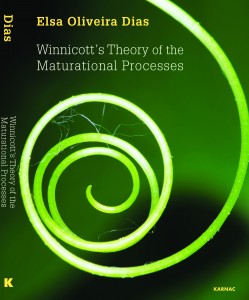Book release: Winnicott’s Theory of the Maturational Processes
“Elsa Oliveira Dias has written an impressive study of Winnicott’s central theory of development. Drawing from its extensive but disparate exposition in his work, she reveals its coherence and relevance in recognising the originality of his contribution to psychoanalysis. Dias demonstrates convincingly Winnicott’s significance to our understanding of the human condition and the suffering that is consequent upon impingements to the maturational process. In highlighting this she brings into focus what has been largely only implicitly known about Winnicott’s ideas and thus will be enormously helpful to those interested in furthering their knowledge and understanding of his contribution.”
![]() Angela Joyce, Training and supervising analyst at the British Psychoanalytical Society; Chair of the Winnicott Trust
Angela Joyce, Training and supervising analyst at the British Psychoanalytical Society; Chair of the Winnicott Trust
“In this scintillating, lovely and erudite read, it is as if the spirit of D. W. Winnicott whispered to Elsa Oliveira Dias in an uncharacteristically systematic and comprehensive way, inspiring her as she wrote. Thus she beautifully achieves her aim and the reader finds here nothing less than a full revelation of Winnicott’s thinking on the individual human being’s development throughout the lifecycle. Furthermore the author has done something which, by his own admission, proved too difficult for Winnicott: she provides an interrogation of the nature and history of his developmental concepts and locates them within the context of the thinking of others.”
![]() Margaret Boyle Spelman, PhD, counselling and clinical psychologist, psychoanalytic psychotherapist, and organisational psychologist; co-editor of The Winnicott Tradition
Margaret Boyle Spelman, PhD, counselling and clinical psychologist, psychoanalytic psychotherapist, and organisational psychologist; co-editor of The Winnicott Tradition
“An important and exceptional book. It presents an in-depth, wide-ranging and rigorous investigation of Winnicott’s central theory of maturational processes and its interrelation with psychic disorders. This investigation is based on a close reading of the whole of Winnicott’s work, comparing the most diverse texts, and thus creating a comprehensive, integrated, and historically contextualized body of knowledge. All this is done with a fearless appreciation of the originality of Winnicott’s thinking, and its radical departure from traditional psychoanalysis. I have no doubt that this book will become a must-read in any serious endeavour to profoundly grasp Winnicott’s unique contribution and innovative influence on psychoanalytic theory and practice.”
![]() Ofra Eshel, faculty, training and supervising analyst, Israel Psychoanalytic Society; co- founder, Israel Winnicott Center; founder, the track of Independent Psychoanalysis, Tel- Aviv University
Ofra Eshel, faculty, training and supervising analyst, Israel Psychoanalytic Society; co- founder, Israel Winnicott Center; founder, the track of Independent Psychoanalysis, Tel- Aviv University
